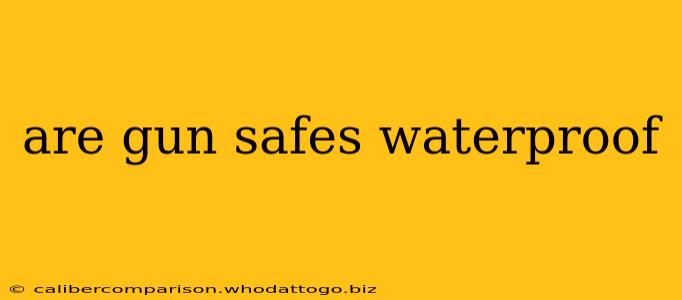The question, "Are gun safes waterproof?" is a crucial one for gun owners concerned about protecting their firearms from the elements. The simple answer is: no, most gun safes are not completely waterproof. However, the level of protection offered varies significantly depending on the safe's construction and features. This guide will delve into the nuances of water and fire resistance in gun safes, helping you make an informed decision when choosing a safe for your valuable firearms and other possessions.
Understanding Water Resistance Ratings
Unlike electronics that might have an IPX rating for water ingress protection, gun safes don't typically use a standardized waterproof rating system. Instead, manufacturers often use marketing terms like "water-resistant" or "weatherproof," which can be misleading. These terms generally indicate a certain degree of protection against moisture, but don't guarantee complete waterproofing.
A truly waterproof safe would require a hermetically sealed design, which is impractical for a gun safe due to the need for ventilation and access. Excessive moisture trapped inside can lead to rust and damage to your firearms.
Factors Affecting Water Resistance in Gun Safes
Several factors determine a gun safe's ability to withstand water damage:
1. Seal Design:
- Gaskets: High-quality gun safes typically feature robust rubber gaskets around the door to create a seal against moisture. The quality and condition of these gaskets are crucial. Damaged or deteriorated gaskets significantly reduce water resistance.
- Door Construction: A well-constructed door with a tight fit against the body of the safe is essential for minimizing water intrusion.
2. Safe Location:
- Environment: Even the most water-resistant safe is vulnerable if placed in a consistently damp or flooded location. Basements prone to flooding or areas with high humidity are unsuitable locations for any safe, regardless of its advertised water resistance.
3. Material:
- Steel: While steel is resistant to rust, prolonged exposure to water can lead to corrosion over time. The thickness and quality of the steel used in the safe's construction affect its resistance.
Fire Resistance vs. Water Resistance
It's important to distinguish between fire resistance and water resistance. Many gun safes are advertised as fire-resistant, meaning they can protect their contents from the heat and flames of a fire for a specific duration. This fire protection is achieved through specialized insulation materials. However, fire resistance doesn't automatically translate to water resistance. A fire-resistant safe might still be susceptible to water damage if submerged or exposed to prolonged dampness.
What to Look For When Choosing a Safe
When selecting a gun safe, consider these factors related to water protection:
- Manufacturer's Claims: Carefully review the manufacturer's specifications. Be wary of exaggerated claims about water resistance.
- Location: Choose a location that minimizes the risk of water damage. A dry, elevated location is ideal.
- Regular Maintenance: Inspect the gaskets regularly and replace them if they show signs of wear or damage.
Conclusion: Protecting Your Firearms From Water Damage
While a truly waterproof gun safe is rare, you can significantly improve your protection by choosing a high-quality safe with strong seals and by storing it in a dry location. Remember that preventative measures, such as regular inspection and maintenance, are crucial in safeguarding your valuable firearms from the damaging effects of water. Prioritize a safe that prioritizes both fire and water mitigation strategies to ensure the ultimate protection for your investment.

